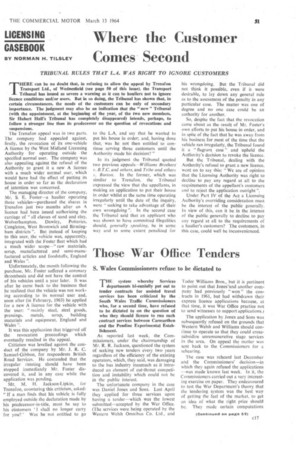Where the Customer Comes Second
Page 53

If you've noticed an error in this article please click here to report it so we can fix it.
TRIBUNAL RULES THAT L.A. WAS RIGHT TO IGNORE CUSTOMERS RE can be no doubt that, in refusing to allow the appeal by Trenafon Transport Ltd., of Wednesfield (see page 50 of this issue), the Transport Tribunal has issued as severe a warning as it can to hauliers not to ignore licence conditions and/or users. But in so doing, the Tribunal has shown that, in certain circumstances, the needs of the customers can be only of secondary importance. The judgment may also be an indication that the "new" Tribunal (with the appointment, at the beginning of the year, of the two new members, Sir Hubert Hull's Tribunal has completely disappeared) intends, perhaps, to follow a stronger line than its predecessor on the question of revocations and suspensions.
The Trenafon appeal was in two parts. The company had appealed against, firstly, the revocation of its one-vehicle A licence by the West Midland Licensing Authority for operating outside . the specified normal user. The company was also appealing against the refusal of the Authority to grant it a new A licence with a much wider normal user, which would have had the effect of putting its house in order so far as the declaration of intention was concerned.
' The managing director of the company, Mr. S. E. Foster—a haulier operating three vehicles—purchased the shares in Trenafon just two months after an A licence had been issued authorizing the carriage of "all classes of sand and clay, Wolverhampton, Dawiey, .Potteries, Congleton, West Bromwich and Birmingham districts ". But instead of keeping to this user, the vehicle was, apparently, integrated with the Foster fleet which had a much wider scope—" raw materials, scrap, manufactured and semi-manufactured articles and foodstuffs, England and Wales ".
Unfortunately, the month following the purchase, Mr. Foster suffered a coronary thrombosis and did not have the control of his vehicles until a year later. It was after he came back to the business that he realized that the vehicle was not working according to its normal user and, soon after (in February, 1963) he applied for a new A licence for the vehicle with the user: " mainly steel, steel goods, pressings metals, scrap, building materials and equipment, England and Wales ".
It was this application that triggered off the revocation proceedings which eventually resulted in the appeal.
Criticism was levelled against the conduct of the company by Mr. J. R. C. Samuel-Gibbon, for respondents British Road Services. He contended that the irregular running should have been stopped immediately Mr. Foster discovered it, and in any case while the application was pending.
Mr, M. H. Jackson-Lipkin, for Trenafon, countering this criticism, asked: "If a man finds that his vehicle is fully employed outside the declaration made by his predecessor-in-title, must he say to his cfistomers 'I shall no longer carry for you? ' Was he not entitled to go
to the L.A. and say that he wanted to put his house in order; and, having done that, was he not then entitled to continue serving those customers until the Authority made his decision? "
In its judgment the Tribunal quoted two previous appeals—Williams Brothers" v. B.T.C. and others', and Tribe and others v. Burton. In the former, which was similar to Trenafon, the Tribunal expressed the view that the appellants, in making an application to put their house in order whilst at the same time operating irregularly until the date of the inquiry, were "seeking to take advantage of their own wrongdoing ". In the second case the Tribunal said that an applicant who was shown to have committed illegalities should, generally speaking, be in some way and to some extent penalized for
his wrongdoing. But the Tribunal did not think it possible, even if it were desirable, to lay down any general rule as to the assessment of the penalty in any particular case. The matter was one of degree and no one case could be an authority for another.
So, despite the fact that the revocation came about as the result of Mr. Foster's own efforts to put his house in order, and in spite of the fact that he was away from his business for most of the time that the vehicle ran irregularly, the Tribunal found it a 'flagrant, ease" and upheld the Authority's decision to revoke the licence.
But the Tribunal, dealing with the Authority's refusal to grant a new licence, went on to say this: "We are of opinion that the Licensing Authority was right to decline to pay any regard at all to the requirements of the appellant's customers and to reject the application outright ".
Under Part IV' of the Act a Licensing Authority's overriding consideration must be the interest of the public generally. In view of this, can it be in the interest of the public generally to decline to pay any regard at all to the requirements of a haulier's customers? The customers, in this case, could well be inconvenienced.








































































































































